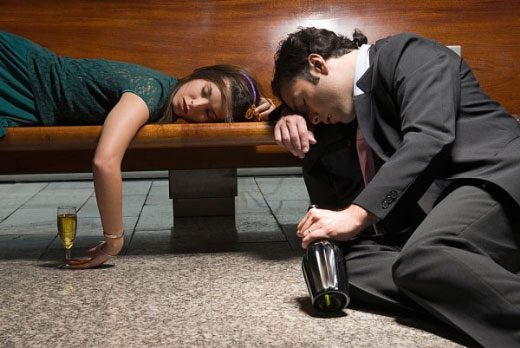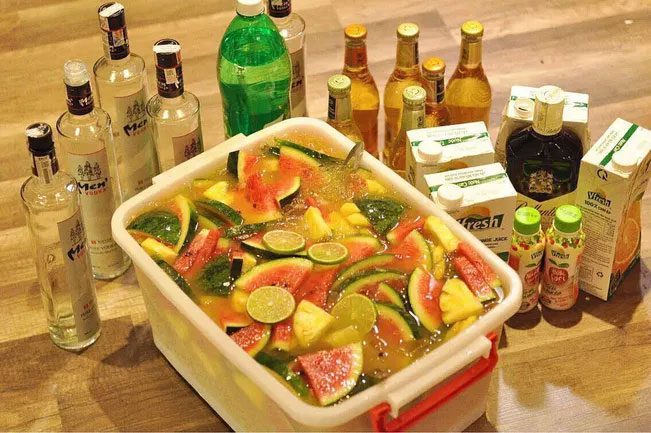Many people believe that mixing wine, beer, and spirits can lead to a worse hangover. However, scientists assert that this is not always true, and there are ways to help you avoid “collapsing” when mixing different alcoholic beverages.
Alcohol intoxication often leaves anyone waking up feeling tired, nauseous, extremely thirsty, and with a pounding headache. A study published in 2000 confirmed that the main causes of hangover symptoms are dehydration, hormonal changes such as aldosterone and cortisol, as well as the toxic effects of alcohol.
Additionally, researchers found evidence that the immune system is compromised, which can contribute to headaches, nausea, and fatigue.
The first component of the two main factors in beverages that clearly affects intoxication levels is the alcohol content. The higher the alcohol content and the faster it is consumed, the more severe the intoxication. However, this is only an average phenomenon.
The same amount of alcohol does not always cause the same level of intoxication in everyone. Many people report that they do not feel drunk, and no one truly knows why. In a study involving young Dutch vacationers, nearly one-third of those who consumed at least 12 units of alcohol (equivalent to 4 glasses of 250ml wine) did not get drunk.

Alcohol intoxication often leaves anyone waking up feeling tired.
Mixing spirits with beer may make us more susceptible to intoxication. Scientists explain this through two hypotheses. First, beer contains carbonation, various flavors, and additives. These substances enhance the absorption of alcohol from beer and spirits in the digestive system. Consequently, blood alcohol concentration rises rapidly. However, the liver can only process a certain amount at a time, so the toxins that the liver has not metabolized will spread throughout the body, including the brain. Their toxicity leads us to experience intoxication.
Second, in addition to ethanol, many other alcohol derivatives present in beer and spirits can also cause intoxication. Numerous studies have shown that combining various alcohol derivatives increases the likelihood of getting drunk. However, some studies indicate that there is no correlation here.
Not only do many people mix beer with spirits before drinking, but they also choose “which to drink first.” Many men’s experiences suggest that “drinking beer before spirits makes one more likely to get drunk, while drinking spirits before beer results in less intoxication.” In reality, these experiences can be easily misunderstood.
“There is no clear biological mechanism showing that drinking beer or spirits first leads to greater intoxication. Experts say that the level of intoxication a person experiences depends on the speed and total amount of alcohol consumed, the liver’s metabolic capacity, the brain’s tolerance, and the overall reaction of each individual,” shared Dr. Tran Hoa An from Ho Chi Minh City University of Medicine and Pharmacy.

Mixing spirits with beer may make us more susceptible to intoxication.
Mixing different beverages does not necessarily increase the total amount of alcohol absorbed, except in the case of cocktails. If combining 3 or 4 types of spirits with other components, the final outcome for someone drinking them all at once may be a splitting headache and a dry throat.
Besides ethanol triggering intoxication, other key components affecting intoxication are what the industry refers to as “congeners.” These are byproducts produced during fermentation, such as acetone, acetaldehyde, fusel oil, and tannins – the latter being well-known for their ability to create dark colors and contribute to the flavor of beverages. For instance, corn whiskey contains 37 times more congeners than vodka.
To investigate the impact of these substances on intoxication levels, American researchers selected college students with good alcohol tolerance. On different nights, volunteers were given corn whiskey with cola, vodka with cola, or fake whiskey mixed with flavored mineral water, enhanced with a few drops of corn whiskey or vodka to mimic real alcohol. They drank until reaching a blood alcohol level of 0.11g/100ml breath, which is 2 – 5 times the legal limit for driving, depending on the regulations of their country.
The study participants then spent the night at the hospital and were awakened at 7 AM the next morning for breakfast before undergoing a series of tests. Results showed that students who drank corn whiskey rated their hangover as the worst, yet interestingly, they still performed well on tasks such as reaction time tests.
According to experts, clear spirits like white rum, vodka, and gin tend to cause less severe intoxication because they contain relatively low levels of congeners compared to darker spirits.
No scientist has conducted a balanced study where participants are randomly asked to drink beer first, then wine, or wine first, then beer. However, experts have drawn conclusions based on the assessed strength of these beverages. Beer is only as strong as 1/3 – 1/2 of wine, so drinking beer before heavier alcoholic beverages is less likely to result in intoxication and more likely to avoid severe drunkenness.
If someone starts with wine or spirits, their judgment may be impaired, leading them to consume heavier alcohol later. There is now solid evidence that people are often not good at assessing their own level of intoxication. At lower levels, people tend to overestimate their blood alcohol content, but after a few drinks, they begin to underestimate it.
For all these reasons, experts say that one cannot blame intoxication solely on mixing different alcoholic beverages. Intoxication can ultimately be due to the high level of congeners in drinks or simply drinking too much. The scientific community has also examined methods for curing hangovers, and the British Medical Journal once published results from a series of tests, from borage and artichoke to prickly pear in 2005. The unfortunate news for those seeking relief is that none of these methods are truly effective.



















































